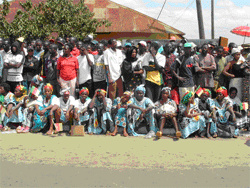 |  | |
 |
| ||||||||
|
|
|
 2003-2006 witnessed the launch of an innovative project entitled “Families First Africa” designed to break the cycle of HIV infection and destruction of family units in Africa with special emphasis on HIV transmission from mother-to-child.
2003-2006 witnessed the launch of an innovative project entitled “Families First Africa” designed to break the cycle of HIV infection and destruction of family units in Africa with special emphasis on HIV transmission from mother-to-child.
The Families First Africa Project is a UNESCO project, made possible by generous extrabudgetary funding from the Italian Government, and carried out together with the World Foundation for Aids Research and Prevention (Paris), the Institute of Human Virology (Baltimore) and the University of Rome “Tor Vergata” (Rome), to assist the HIV and AIDS Programmes of Côte d'Ivoire, Burkina Faso and Cameroon. The Project's three essential goals are described by the acronym ACT:
· Advocate for family-oriented AIDS prevention programs, especially targeting new interventions that reduce mother to child HIV transmission; · Create an international community linking Africa with developed countries with the common goal of reducing HIV spread through prevention education and the development of innovative platforms for neonates' protection; and · Teach the fundamental scientific and medical skills necessary to enable local prevention and research programs in our African partner countries, through training, international scholarly exchange, and durable collaboration.
By building the capacity for local leadership and independent efforts to confront HIV, it is also hoped to improve the health technology in partner countries that will help to confront other emerging or re-emerging diseases and create a nexus for improving public health and scientific education.
In order to carry this out, the “Families First Africa" project aims to:
i) Develop scientific and educational partnerships between developed and developing countries; ii) To ensure training and access to higher education programs for African doctors; iii) Elaborate appropriate and innovative skills based on scientific research for prevention education particularly for what concerns mother-to-child transmission of HIV/AIDS in Africa; iv) Develop an innovative platform for tuberculosis and AIDS neonatal vaccination through promotion of research in Africa; v) Initiate and promote the creation in Africa of specific centers linking research, training and prevention education.
The activities implemented from 2003 to 2006 and those envisaged for a continuation of the project in 2007 are the result of a collective work through the UNESCO "Families First Africa" project, by a team composed of Vittorio Colizzi, Professor of Immunology and Holder of the UNESCO Chair in Interdisciplinary Biotechnology at the University of Rome "Tor Vergata" and the "Families First Africa" Scientific Coordinator, Prof. Luc Montagnier, President of the World Foundation for AIDS Research and Prevention, Dr David Pauza, Head of the Division of Experimental Medicine at the Institute of Human Virology, University of Maryland, USA, Dr Maciej Nalecz Director of the Division of Basic and Engineering Sciences at UNESCO, M. Pierluigi Vagliani, UNESCO Consultant, Dr Giulia Cappelli, CNR Researcher and Head Project at the International Research Centre “Chantal Biya” (IRCCB), Yaoundé, Cameroon, Dr Henri Chenal, Director General of the Centre International de Recherches Biocliniques d'Abidjan (CIRBA), Côte d'Ivoire, Dr Jacques Simpore, Head of the Laboratory at the Centre Medical St. Camille, Ougadougou, Burkina Faso and Prof. Lise Thibodeau at the Research Agriculture Centre in Montreal, Canada.
Information on the "Families First Africa" project may be obtained from: Prof L Montagnier (c/o c.restif@unesco.org)
|
|
|
|
|
|||||||||||||||||||||||||||||||||||||||||||||
| ID: 5185 | guest (Read) | © 2004 - UNESCO - Contact |